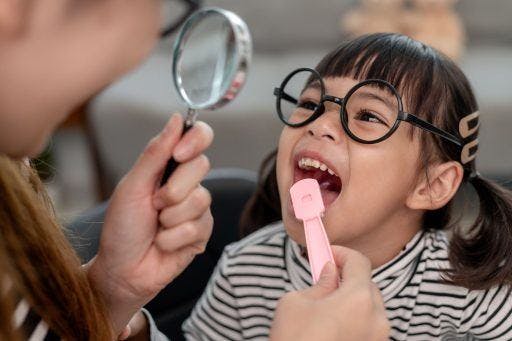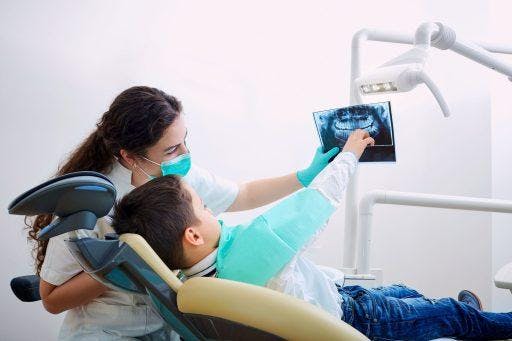Visit any online parenting community, and you will discover that your child’s first dental appointment requires lots of time and patience. It can also take a village to make the visit a stress-free experience. But the work begins with you, Mum and Pop.
Anything new, loud, or big can appear scary to toddlers, making them tense or nervous. They will rely on your guidance to overcome apprehensions even before you both step inside a dental clinic.
What Age Is Best for the First Dental Visit?
According to the Australian Dental Association, kids must see the dentist once their teeth come through or they’ve turned 12 months old. The timing of when to take your baby to the dentist can also depend on when their first tooth erupts. For some, teething can start as early as three months old.
You can book a dental appointment as soon as this happens. Your oral health provider will check your child’s teeth and jaw and advise you on schedules for future visits.
What to Do at Home Before the First Dental Visit
Explaining to your child what happens in a dental appointment may require days or weeks, depending on their age and temperament. Your child can get worked up at one year old when faced with anything strange. Try these techniques when preparing them for their first visit to ease their anxieties.
1. Catch yourself if you have a fear of dentists.
You play a critical role in your children’s fear development, so be careful about voicing your worries and fears in front of your child. For example, an Oral Biology and Dentistry study reports that over 40% of parents/guardians negatively influence their children’s perception of dental visits.
2. Use positive words.
Talk to your child in a friendly and calm voice, and use simple words to explain procedures. For example, you can say, “The dentist is going to count your teeth and make sure they stay white and shiny.” Avoid using words like “hurt”, “pain”, or “needle” when talking about what your child can expect at the dental clinic.
3. Introduce a book or video about dental visits.
Build your child’s confidence further by letting them read books or watch videos about dental health. On Amazon, some of the bestselling children’s books on dental visits include:
- The Berenstain Bears Visit the Dentist
- Elmo Visits the Dentist
- Daniel Goes to the Dentist (Daniel Tiger’s Neighbourhood)
You may also want to check out the Australian Dental Association’s book recommendation with this cheeky title, Guardians of Gums.
As you get nearer your appointment, take your child through the walkthrough YouTube videos by the Royal Children’s Hospital Melbourne and the British Society of Paediatric Dentistry.
4. Perform role play.
Let your child play as the dentist and practise giving you a dental checkup. You can also pretend to be the dentist and count and brush your child’s teeth or let them do the same with a stuffed animal or doll. At the very least, your child can imagine what it’s like when someone looks inside their mouth.
Finally, practise looking at your teeth in the mirror and brushing your teeth together. Playing scenarios like this can help your child see that they can experience dental visits without fear.
What to Expect During Their First Dental Visit
Preparing your child for what they will see, hear, and smell at the dental clinic can lessen feelings of confusion and ambivalence. It helps to describe the setting like a storyteller. Include details such as:
- The dentist will wear a mask and white coat over colourful scrubs.
- Their office has lots of shiny, special equipment.
- It might smell like toothpaste, alcohol, and other cleaning supplies.
- There’s a comfy reclining chair for patients to lie down on.
- The dentist will use a small flashlight and mirror to check teeth, but it won’t hurt.
How to Manage a Fussy Child During the First Dental Visit

When the dental appointment arrives, your child has a good idea of what’s ahead, thanks to your efforts to prepare them at home. But don’t be surprised if they suddenly cry, become fussy, or refuse to cooperate.
Instead, try to relax when it happens, and remember you now have a partner in your dentist trained to comfort your child. Then, try these tips with the dental staff’s help when your child needs additional coaxing.
1. Hop onto the dental chair first.
Having the dentist check your teeth can make your child curious enough to approach the chair, and it’s even better if they ask to sit on your lap. Not only will they see what the dentist is doing, but the opportunity also encourages your child to go next.
2. Ask the dentist for a show-and-tell.
In the Royal Children’s Hospital Melbourne video, the child touched and felt the tools as the dentist explained how she uses them. The dentist even demonstrated how she’d clean the teeth by gently brushing the child’s nails. Giving kids this knowledge reduces feelings of uncertainty that come with the unfamiliar.
3. Engage your child in conversation.
Ask your child questions about their interests, hobbies, or favourite things to help them focus on something else. Seeking their permission before doing anything allows them to have some control over what’s happening.
4. Use praise and positive reinforcement.
Praise your child for their cooperation during and after the visit. For instance, you can reward your child with a sticker or a fun activity after the dental appointment. Let them also choose the toothpaste flavour and toothbrush colour to motivate them to perform dental hygiene independently.
Choosing Your Child’s Dentist

Even if your chosen paediatric dentist comes from a friend’s referral, take the time to visit to see the clinic before your appointment. The good ones will accommodate a tour to familiarise your child with the staff and the clinic’s layout.
If you know your child has special needs or always feels anxious in a room full of strangers, you may want to find a dental clinic incorporating Snoezelen principles. “Snoezelen” refers to a multisensory environment that helps reduce anxiety and promote relaxation. People with developmental disabilities or those who may find traditional dental settings challenging benefit from Snoezelen rooms, according to research cited in a Clinical, Cosmetic and Investigational Dentistry article.
Snoezelen dental clinics use soft lighting, gentle sounds, and soothing textures to help people feel more comfortable during their visit. Some may have a special Velcro butterfly vest that hugs the child for a deep-pressure sensation.
Once you’ve chosen a clinic, tell the dental staff ahead of time about your child’s needs, especially if they have allergies or a medical condition. Meanwhile, your dentist will probably ask you to book the dental appointment when your child is fed and well-rested.
Building a Legacy of Healthy Smiles
On a last note, avoid using the dentist to scare your kids into practising oral hygiene. Saying something like, “If you don’t brush your teeth, the dentist will have to drill them”, can instil lifelong uneasiness about dental checkups and treatment.
Studies have shown that dental fear discourages adults from visiting the dentist. The consequences include tooth decay, gum disease, malocclusions, and early tooth loss. Moreover, delaying dental treatment may lead to more complications beyond oral health. Gingivitis, for instance, has been linked to diabetes and heart disease.
Oral hygiene knowledge will also give your child the necessary discipline if they need orthodontic treatment in the future. For instance, removable clear aligners (such as ClearCorrect) make chewing food and brushing teeth more comfortable. But they must wear these aligners for a certain number of hours to ensure treatment goes well. Aligners also need regular cleaning and proper storage when not in use. A child who grows up educated in dental health can handle this responsibility.
While they take up a lot of your energy and time, dental visits ingrain healthy habits that last a lifetime. But, more importantly, a positive experience sets the stage for your future grandchild’s healthy smile. Isn’t it amazing what a simple dental appointment can accomplish?
References:
Appukuttan, D. P. (2016). Strategies to manage patients with dental anxiety and dental phobia: literature review. Clinical, Cosmetic and Investigational Dentistry, 35.
Boynes, S. G., Abdulwahab, M., Kershner, E., Mickens, F., & Riley, A. (2014). Analysis of parental factors and parent-child communication with pediatric patients referred for nitrous oxide administration in a rural community health center setting. Oral Biology and Dentistry, 2(1), 10.
Dahlander, A., Soares, F. C., Grindefjord, M., & Dahllöf, G. (2019). Factors Associated with Dental Fear and Anxiety in Children Aged 7 to 9 Years. Dentistry Journal, 7(3), 68.
Sigal, A., & Sigal, M. (2022). The Multisensory/Snoezelen Environment to Optimize the Dental Care Patient Experience. Dental Clinics of North America, 66(2), 209–228.
Stanford Medicine Children’s Health. (n.d.).
When should my child first see the dentist? (2016). Australian Dental Association.
Wu, L., & Gao, X. (2018). Children’s dental fear and anxiety: exploring family related factors. BMC Oral Health, 18(1).



